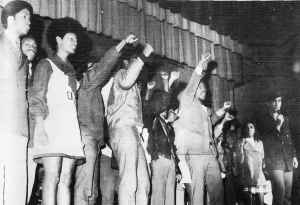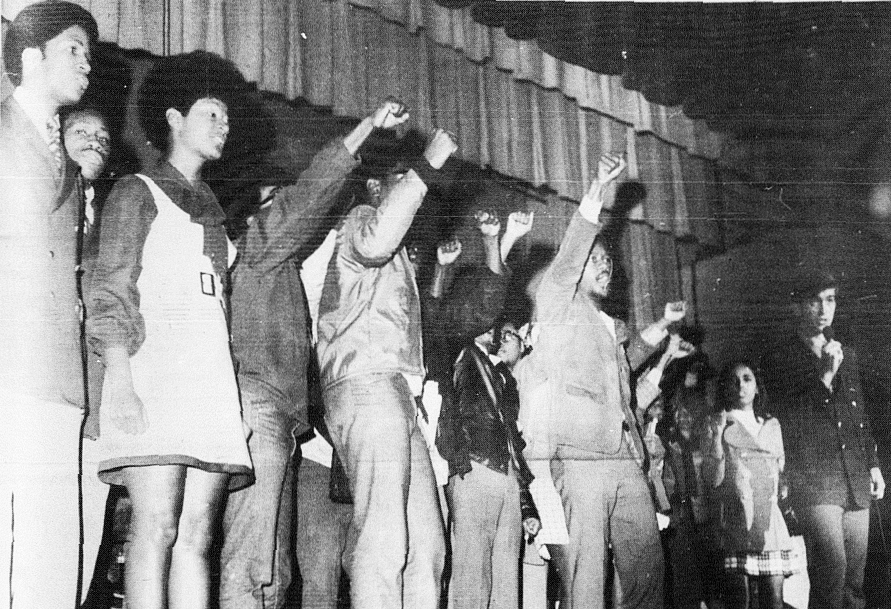
The University of Mississippi was not always as accepting or inclusive as it is today. In 1970, Black students at UM faced a racially divided and often discriminatory campus, with issues ranging from segregated social gatherings to restricted access to academic advising. Despite this racist, hostile environment, these students did not back down.
90 Black students came together to form the Black Student Union and rally against administrators for change. Eight Black students, referred to as the Ole Miss Eight, took the stage at Fulton Chapel on Feb. 24, 1970 and peacefully listed the BSU’s 27 demands. The students were quickly arrested and not only sent to prison, but also expelled from the university.
The students who participated in that 1970 protest will be commemorated at Fulton Chapel on Thursday, Feb. 15 at 6 p.m.
“The purpose of this commemoration is to ensure that the memory and impact of the Fulton Chapel Protest is preserved for future generations. So many current and former students are unaware of this protest,” Ellie Moore, director of UM’s Speaking Center said. “We must continue to speak up about it or those moments will be lost.”
Moore feels that it is extremely important to commemorate the 1970 BSU members.
“They were instrumental in pushing for positive change through activism and advocacy,” Moore said. “Their efforts contributed to the advancement of civil rights and the creation of more inclusive and equitable university environments over time.”
Acclaimed author W. Ralph Eubanks, UM visiting professor and writer-in-residence, approached Moore because he wanted the commemoration of the 1970 Fulton Chapel Protest to be student-focused.
Eubanks began studying the 1970 Fulton Chapel Protest with an article he wrote for the New Yorker in 2020. He also teaches a class on activism in the Center for the Study of Southern Culture, where he is a Black Power at Ole Miss Faculty Fellow.
“While I was not here during the 1970 protest, discussions of the events surrounding the protest were part of my experience at the university as an undergraduate,” Eubanks, a 1978 UM graduate, said.
Students from the Department of Writing and Rhetoric Debate Team and the Speaking Center will engage with the 27 demands made in 1970 by Black students and evaluate whether or not the university has since met these demands.
“They are engaging with the legacy of the protest and thinking about not only what has changed, but also with what is left to be done to fulfill the demands the students made,” Eubanks said. “I believe that when you understand how the past influences the present, it can help you understand the world.”
Seven students will present during the event. The presentations range from the reenactment of the 27 demands to a poetry reading and the singing of the Black National Anthem.
Aminata Ba, a freshman public policy leadership and economics double major, will recite the 27 demands from the protest during the presentation.
“What’s interesting about the event is that the 27 demands are going to hold a light up to whether or not the university has since met the needs of Black students 50 years later,” Ba said. “I feel that the 27 demands portion is going to help students track the progress that the school has made over the last fifty years in terms of inclusion and diversity.”
The presentation is free and open to the public. Ba feels that it is important for the entire community to commemorate how much the university, as well as the nation, has progressed.
“I agreed (to participate) because when I was reading the 27 demands, I cried,” Ba said. “I saw myself in those students — basically children asking to be treated as human.”
Amirhea Bishop, a graduate student pursuing a Master of Arts in Southern studies, will also unveil a new Mississippi Freedom Trail Marker memorializing the courageous figures of the Fulton Chapel Protest as pivotal in the state’s civil rights movement.
“Questions of power and knowledge are central to understanding the movement that transformed the South like the 1970 Fulton Chapel Protest,” Eubanks said. “I hope that because of this program, those who attend will think more about the relationship between power and knowledge and begin to talk about the ways protest movements can be transformative and can reset power imbalances.”
Following student presentations, those in attendance will get the opportunity to engage with two individuals who participated in the 1970 protest, Kenneth Mayfield and Donald Cole. Two members of the cast of Up With People, a non-profit performing arts group that performed during the protest, will also attend the event.
“We will be conducting oral histories with them (protest participants) to get a fuller picture of what they witnessed that night in 1970 as well,” Eubanks said.
After the presentation, Ba hopes that the audience will take home the message that change is possible.
“Change starts with each and every single one of us,” Ba said. “It’s important to stand up for what is right even in the face of adversity.”














